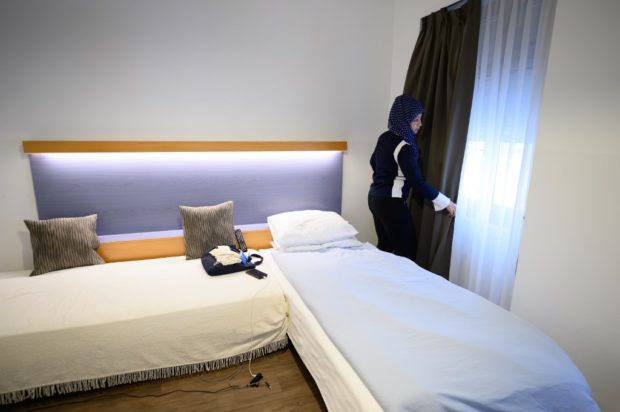Homeless taste hotel ‘luxury’ during pandemic

Hafida Marsli, a 42-year-old woman who made her way from Morocco to Switzerland a decade ago in search of a better life only to eventually find herself homeless, poses on April 16, 2020 in her room at the three-star Bel Esperance Hotel in Geneva, amid the COVID-19 pandemic, caused by the novel coronavirus. – Last month, as the hotel a profit-driven business run by the Salvation Army faced a cascade of cancellations, it decided to turn over the entire establishment to house homeless women and youths and help get them off the streets amid the COVID-19 pandemic. At the hotel in the heart of Geneva’s Old City, 20 rooms have been provided to homeless women, while 11 have been given to unaccompanied minors who have no access to seeking asylum in Switzerland. (Photo by Fabrice COFFRINI / AFP)
Sofiane Rahmani can hardly believe his luck. After several years of living on the street and bouncing between shelters, he now has his own hotel room, personal bathroom and all meals provided.
“It’s true luxury,” the 16-year-old Algerian illegal migrant told Agence France Presse at the three-star Bel Esperance Hotel in Geneva.
Last month, as the hotel faced a cascade of cancellations, it decided to turn over the entire establishment to house homeless women and youths and help get them off the streets during the COVID-19 pandemic.
At the hotel in the heart of Geneva’s Old City, 20 rooms have been provided to homeless women, while 11 have been given to unaccompanied minors like Rahmani who have no access to seeking asylum in Switzerland.
“It happened fairly naturally,” hotel director Alain Meuwly told AFP, sitting in the breakfast room, where tables have been spaced far apart and equipped with only one chair each.
Article continues after this advertisementWhen Switzerland began cancelling all public events and closing restaurants and shops to halt the spread of the virus in early March, “more than 90 percent of our bookings were cancelled,” he said.
Article continues after this advertisement1,100 deaths
The hotel, a profit-driven business run by the Salvation Army, was empty.
At the same time colleagues within the Christian charity told him they were looking for safe ways to house some of the estimated 1,000 homeless people in Geneva.
Good for business
Switzerland, which to date has reported nearly 28,000 confirmed COVID-19 cases and more than 1,100 deaths, does not have a national policy against homelessness, with each of the confederation’s 26 cantons implementing their own approaches.
Transformation
In Geneva, the Salvation Army and other organizations have long provided emergency overnight shelters with a few dozen beds, but never before anything with 24-hour service.
Meuwly said the transformation process was quite simple. The hotel’s regular staff were all placed on temporary unemployment, and a team of social workers were brought in to accommodate the new residents, who will be allowed to stay until June 1.
The dining area was spaced out, masks and disinfectant were provided and only one person was permitted per room.
“Since this is a slightly different clientele we removed some gadgets that you would usually find in a three-star hotel room, like tablets and coffee-makers,” Meuwly acknowledged, stressing that the “comfort level is the same.”
“There are the same beds and bedding, TVs, and especially WiFi. That is something everyone really seems to appreciate.”
Good for business
Ironically, the building served for more than 60 years as a shelter for vulnerable women, but in 1996 it was transformed into a hotel, which today offers elegant, plush rooms that during the high season can go for up to 600 Swiss francs ($620, 570 euros) a night.
Meuwly said he was not worried that housing the homeless might harm business once the crisis ends. “Not at all,” he said, adding that he had received numerous messages from regular customers congratulating him for the initiative and asking how they could help.
“I think it could even be an asset to the business,” he said.
For more news about the novel coronavirus click here.
What you need to know about Coronavirus.
For more information on COVID-19, call the DOH Hotline: (02) 86517800 local 1149/1150.
The Inquirer Foundation supports our healthcare frontliners and is still accepting cash donations to be deposited at Banco de Oro (BDO) current account #007960018860 or donate through PayMaya using this link.